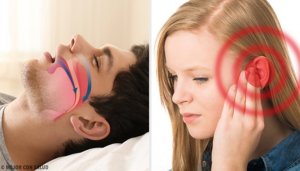8 Bodily Noises that We Tend to Not Pay Attention to


Reviewed and approved by the doctor José Gerardo Rosciano Paganelli
Our body is the most perfect machine that exists.
It’s so wise that it can even warn us when something is happening to it. The issue is that there are very few times that we are aware of these signals and we end up completely looking past them.
The signals that our body sends us often come in the form of sounds. Whether this be clicks, ringing in our ears, snoring, stomach noises, or other bodily noises.
In order for them to not go unnoticed, we’ll share 8 of the sounds that you should pay a little more attention to.
1. Cracking noises in your legs

This type of sound can be caused by many different reasons, such as:
- Muscular fatigue, including possible congestion in the blood vessels and the wearing of the joints in the knees because of overuse.
- Anatomic characteristics of the ligaments and meniscus that, despite not affecting the mobility of the legs, produce a noticeable clicking noise.
- Days filled with extensive movement, especially when the body is not physically used to it.
In the majority of cases, the clicking doesn’t mean there is a problem. However, when they are accompanied by pain or swelling, it is necessary to see your doctor.
It’s important to get a check up since it could be caused by the breakage of a ligament or meniscus, or could even signal the presence of arthritis.
2. Constant snoring

Snoring is generated by the vibration of the airways when air travels through the mouth or nose.
Despite the fact that snoring is fairly common, it’s well known by doctors that, in general, it is caused by some obstruction or blockage in the nose (nostrils), mouth or throat.
These are the most common causes of snoring, and you should see your doctor about them:
- Musculature loss in the throat,
- Obesity,
- Reaction to medications,
- Excessive alcohol consumption,
- Nasal passage blockage,
- Curvature in the septum of the nose.
3. Clicking in your jaw

In some cases, this can mean a displacement of the temporomandibular joint. In other cases, it could be caused by arthritis in the temporomandibular joints.
It can also be caused by bruxism (the habit of grinding your teeth unconsciously), cavities or strong tension in your face muscles.
In any case, we recommend that you consult a medical specialist.
4. Different sounds in your ears

Many times the buzzing that occurs in our ears disappears without having to be treated.
However, in those cases where the sounds appears constantly and doesn’t go away easily, it is recommended that you see a medical specialist. These can be caused by an infection or an illness in the inner ear.
5. Strong cracking noise while your sleep or when you wake up

This type of noise appears suddenly. In general, it tends to be brief and extremely irritating.
In these cases, the exact causes are unknown.
6. Cracking in your shoulders

In these cases, the cracking can mean different things, such as:
- Tendinitis, tendon inflammation caused by a blow or excessive wear and tear.
- Bursitis, inflammation in the pocket between the bone and the shoulder tendon.
- A tear in the rotator cuff in the shoulder.
7. Clicking in the elbow

Clicking in your elbow can be a sign of mechanical problems in the joints and can be caused by different reasons, such as:
- Poor nutrition, which affects the composition of the bones and joints,
- Localized infections,
- Metabolic conditions,
- Injuries generated by strong blows,
- Lack of physical activity and, at the same time, too much of it when performed incorrectly.
In these cases, if the clicking persists for an extended period of time and also causes pain and inflammation, it is recommended that you see a doctor to look for a solution.
8. Clicking in the throat

Clicking in the throat can be more serious than we may think. This, on occasion, can be a symptom of neurologic disorders that affect the tissues, such as with Parkinson disease.
Aside from this, it can also be caused by the growing of the thyroid cartilage. In these cases, you will eventually stop hearing the clicking and the disorder will relieve itself.
Don’t forget, if the bodily noises are accompanied by inflammation or pain, it is important to seek adequate treatment.
In these cases, we recommend that you talk to your doctor. Avoid self-medicating and self-diagnosis.
All cited sources were thoroughly reviewed by our team to ensure their quality, reliability, currency, and validity. The bibliography of this article was considered reliable and of academic or scientific accuracy.
- Tinnitus. 2015; Available at: https://www.nidcd.nih.gov/es/espanol/tinnitus. Accessed Feb 8, 2019.
- Alfredo Santamaría DC, David Astudillo DO. Vía aérea superior, ronquido e implicancias clínicas. Revista Médica Clínica Las Condes 2013 May 1,;24(3):350-357.
- Fantuzzi G. The sound of health. Frontiers in immunology 2014;5:351.
This text is provided for informational purposes only and does not replace consultation with a professional. If in doubt, consult your specialist.








